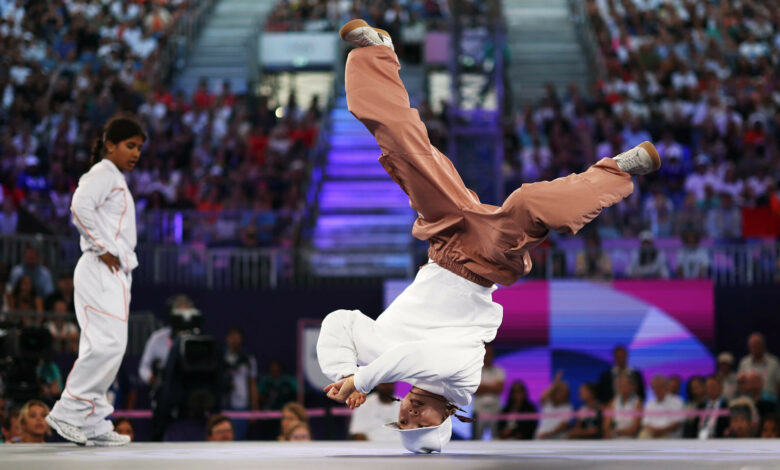Olympic debut, loud and colorful, in the newest chapter of the sport

PARIS — India Sardjoe is 18, has a mouth full of braces and is on the hunt.
“I really enjoy exchanging pins in the Olympic village,” she said Friday after competing in the first Olympic breaking competition at La Concorde. The 2022 world champion, known in the breaking game as B-Girl India, was one of the favorites for the competition but finished just off the podium, losing the bronze medal match to China’s B-Girl 671, also known as Liu Qingyi.
In the end, Japanese B-Girl Ami, also known as Ami Yuasa, defeated Lithuanian B-Girl Nicka (Dominika Banevič) for the gold medal.
“I didn’t really focus on medals at all,” Ami said. “For the final, I just wanted to show my… everything. And I think I did that, yeah.”
A large, enthusiastic and occasionally curious crowd, featuring Snoop Dogg in the afternoon session and IOC President Thomas Bach in the evening session, helped usher in breaking, a new sport here but one that will not be part of the 2028 Summer Games in Los Angeles. There was intrigue in the afternoon when Afghanistan’s Manizha Talash, in her qualifying match against India, revealed a cape beneath her jersey that read “Free Afghan Women.” Manash, a member of the Refugee Olympic Team, a contingent of 37 displaced athletes from around the world, was officially disqualified from her match but had already lost on points before she showed her cape.
The debate over whether breaking is distancing itself from its past, steeped in African-American culture through the dance of young black teenagers in the Bronx in the early 1970s, quickly followed by Latino kids in the city, will continue. But for those who pushed for breaking’s inclusion in the Games, after a decade or so of lobbying and building up the form through breaking leagues around the world, Friday was a big moment.
The most important thing: People were watching on TV. Some, attentivelyOf course it wasn’t universally lovedBut what are these days?
Issues of appropriation and erasure of the original culture of breaking should be amplified and heard. But it was hard not to be impressed by the wonderfully international flavour of the inaugural event here, which reflected the diverse viewpoints and histories of the estimated 30 million breakers worldwide.

B-Girl Ami (Japan’s Ami Yuasa) won gold in the inaugural Olympic break competition on Friday. “I just wanted to show my … everything,” she said. (Elsa/Getty Images)
The evening was noisy and exuberant, with a stage for the DJs and jury set up like a boombox, a tribute to the good old days.
The MCs Friday, Malik and Max were from France and Portugal respectively. The DJs were American (DJ Fleg) and Polish (DJ Plash One). The music they played was varied: “Heart ‘n Soul” by Booker T. Averheart; “Family Affair” by MFSB; “Blow Your Whistle” by DC go-go legends Chuck Brown and The Soul Searchers; “Mu Africa” by The Rift Valley Brothers; “Boom!” by The Roots.
The final eight women came from France, Japan (B-Girl Ami and B-Girl Ayumi), China (B-Girl 671 and B-Girl Ying Zi), Ukraine (B-Girl Kate), France (B-Girl Syssy), Netherlands (B-Girl India) and Lithuania (B-Girl Nicka). The two American breakers in the field, B-Girl Sunny (Sunny Choi) and B-Girl Logistx (Logan Edra), were eliminated before the quarterfinals. American breaker B-Boy Victor (Victor Montalvo) is one of the favorites to win a medal in the men’s competition on Saturday.
“Honestly, I haven’t processed everything yet,” said Kate, full name Kateryna Pavlenko, who lost in the quarterfinals. “But I can’t believe it’s over. I’ve been waiting for this day for a long time. Now it’s over for me. It feels great. I think everyone did a great job and I think the () representation of breaking was super high from the b-girls. I’m very happy to be in the top eight — best b-girls in the world, let’s say.”
The athleticism of so many of the breakers was astonishing as they rocked up and down. B-Girl Ami, who seemed to lack a solid backbone, dominated French B-Girl Syssy 3-0 in the opening quarterfinals, then narrowly edged India in a 2-1 semifinal. B-Girl 671 seemed to somehow change direction as she balanced on her head. Nicka didn’t spin as much as she floated across the floor. Nicka defeated 671 in the semifinals 2-1; 671 defeated India for bronze.
Someone asked 671 afterwards whether the tears in her eyes were because she was happy to win bronze, or because she had lost the chance to win gold.
“Both,” she said. “The first Olympics I’m going to, the medal, first, I’m happy. But also, the fight turned out a little bit (bad). But I’m still going.”

From left to right: B-Girl Nicka (silver), B-Girl Ami (gold) and B-Girl 671 (bronze) show their medals from the first Olympic break competition. (Elsa/Getty Images)
B-Girl Kate moved to Los Angeles just before the Russian invasion of Ukraine in 2022, and her family still lives there. So it’s even more important to her to use breaking to send a message of hope and possibility to her people back home.
“It’s very important because I was born there,” she said Friday. “It shaped me as a person. It made me who I am. Because of Ukraine, I thought maybe it wouldn’t be fair to represent another country. I’m Ukrainian. I was born and raised there. I left early. I know a lot of b-boys and b-girls look up to me, and I give them a little bit of hope to represent someone they can look up to. And for me, it’s the biggest reward ever. … If I can inspire or touch someone from Ukraine with my dance, I’m happy.”
There will probably never be a happy marriage between the old and new schools of breaking. Perhaps a marriage of convenience is the best that can be done. The desire to monetize breaking and show it on larger platforms in the United States will probably make it impossible to keep it under the sole supervision and influence of the founders of the art form. But many among the new generation of breaking, and breakers, understand that attention must be paid to the founders and innovators who created the dance, and on whose shoulders they stand.
“It’s a huge responsibility to represent and keep raising the bar to break through,” Nicka said Friday. “Because they’ve done an amazing job. Big respect to the OGs and the pioneers who invented all those movements. Without them, it wouldn’t have been possible. I’m grateful.”

GALLING DEEPER
A Ukrainian breaker’s journey to the Paris Olympics
(Top photo of B-Girl Ami at Friday’s Olympics: Elsa/Getty Images)




